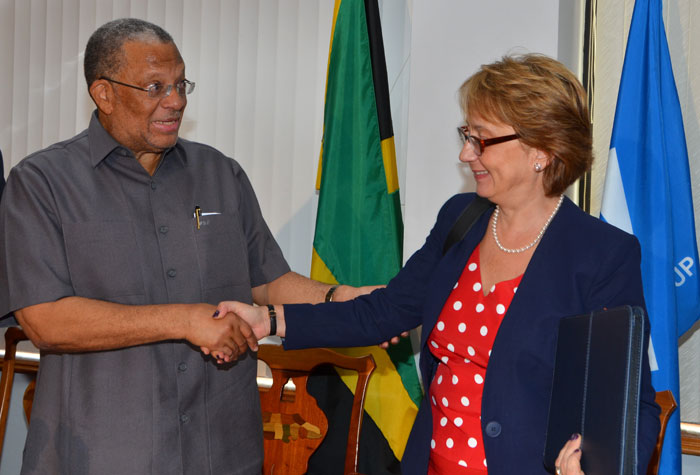Gov’t Secures $810.2 Million World Bank Grant for Climate Change Project
By: , October 5, 2015The Key Point:
The Facts
- The undertaking is part of a package of projects, valued of approximately $3.57 billion (US$30 million), which are being financed in Jamaica under the Pilot Programme for Climate Resilience (PPCR).
- Improvement of the data platform aims to better position Jamaica to adapt to and mitigate the impacts of climate change, characterised by among other things, extreme drought and abnormal rainfall patterns.
The Full Story
The Government has received approximately $810.2 million (US$6.8 million) in World Bank grant funding support to improve climate and weather data collection and information management within Ministries, Departments, and Agencies (MDAs).
The undertaking is part of a package of projects, valued of approximately $3.57 billion (US$30 million), which are being financed in Jamaica under the Pilot Programme for Climate Resilience (PPCR).
The US$1.2 billion PPCR is a funding window of the US$8.1 billion Climate Investment Funds (CIFs), which assists developing countries to integrate climate resilience into development planning.
Improvement of the data platform aims to better position Jamaica to adapt to and mitigate the impacts of climate change, characterised by among other things, extreme drought and abnormal rainfall patterns.
Finance and Planning Minister, Hon. Dr. Peter Phillips, in welcoming the World Bank support, underscored the need to generate data that will adequately assist Jamaica’s preparation to deal with climate change.
He was addressing the signing ceremony held on Friday, October 2, at his National Heroes Circle offices in Kingston.
Dr. Phillips said the climate data project, to be implemented by the Planning Institute of Jamaica (PIOJ), will be of “tremendous” benefit to the country, and particularly, key stakeholders such as farmers, planners, residents in food-prone areas, and tourism and health sector interests.
He noted that the availability of such data is also important “if we are to be able to …take advantage of the availability of resources within the Global (Green) Climate Fund,” which assists developing countries in adaptation and mitigation practices to counter climate change.
World Bank Country Manager in Jamaica, Galina Sotirova, said the project is “important, necessary…and timely.”
She said the World Bank stands ready to support Jamaica in the implementation of the project and “we remain committed to our partnership of more than 51 years, as Jamaica pursues the vision for sustainable and inclusive growth.”
Permanent Secretary in the Water, Land, Environment, and Climate Change Ministry, Dr. Alwin Hales, who represented Portfolio Minister, Hon. Robert Pickersgill, noted that at the project will better equip beneficiary agencies “to provide world class services, as their core functions will be greatly improved and enhanced.”
For her part, PIOJ Deputy Director for Sustainable Development and Social Planning, Claire Bernard, said the institute is “excited” about the initiative.
“Not only will it improve accessibility and availability (of climate change data), but it will provide meaningful information to support the achievement of the goals of Vision 2030 Jamaica, and put us in a position, also, to achieve the goals of the newly approved Sustainable Development Goals (SDGs),” she noted.
The SDGs, also called Global Goals and Agenda 2030, are an inter-governmentally agreed set of targets relating to international development.
They will follow on from the United Nations (UN) Millennium Development Goals (MDGs), which expire at the end of 2015.
The project, titled: ‘Improving Climate Data and Information Management’ also includes the provision of technical assistance in climate resilience planning for relevant beneficiary agencies; improvements in their project preparation and management capabilities; and public education awareness and information dissemination.
Primary beneficiaries of the project, include: the Ministry of Water, Land, Environment, and Climate Change, and its agencies – the National Meteorological Service, Water Resources Authority (WRA), and National Spatial Data Management Division; the Ministry of Health, among other stakeholders.
The CIFs were designed by developed and developing countries to enable nations to continue their development path to achieve the MDGs.
The funds are implemented with the multilateral development banks to bridge the financing and learning gaps, with the World Bank serving as the trustee.

